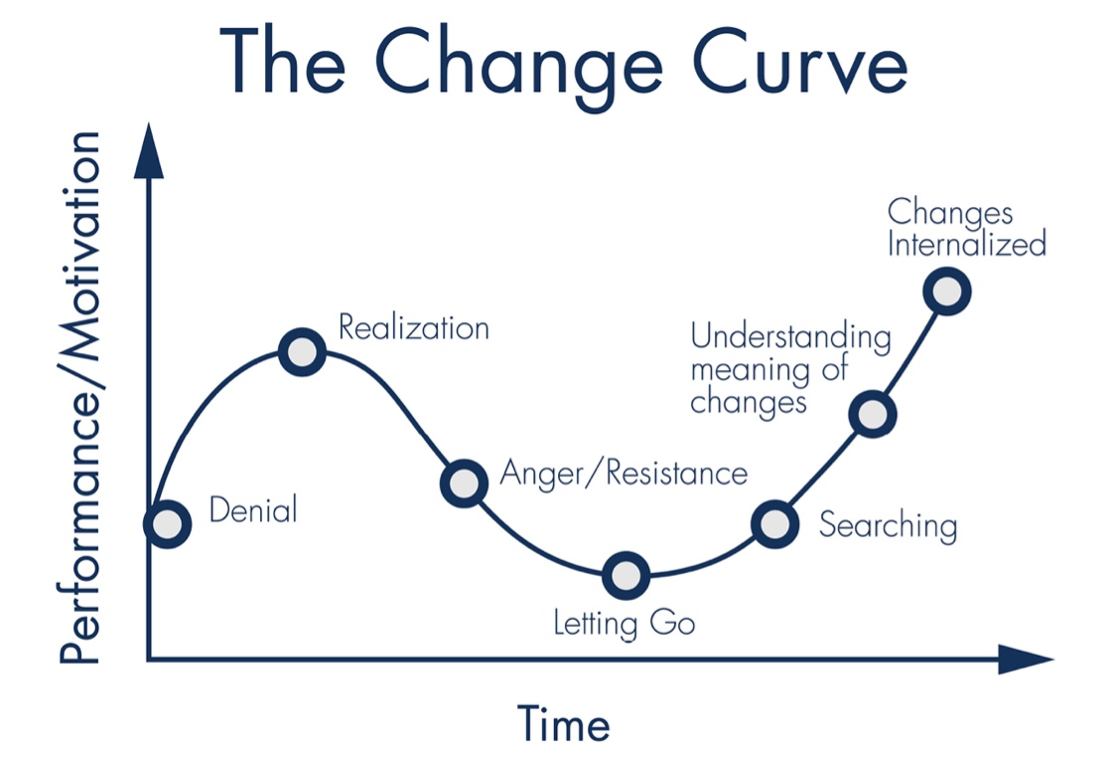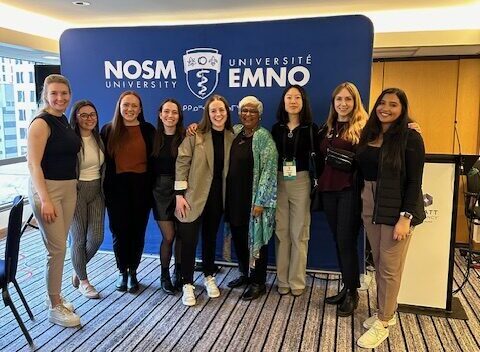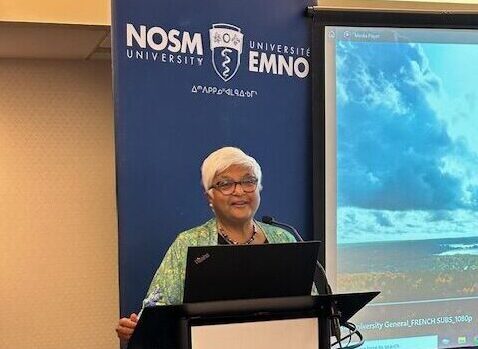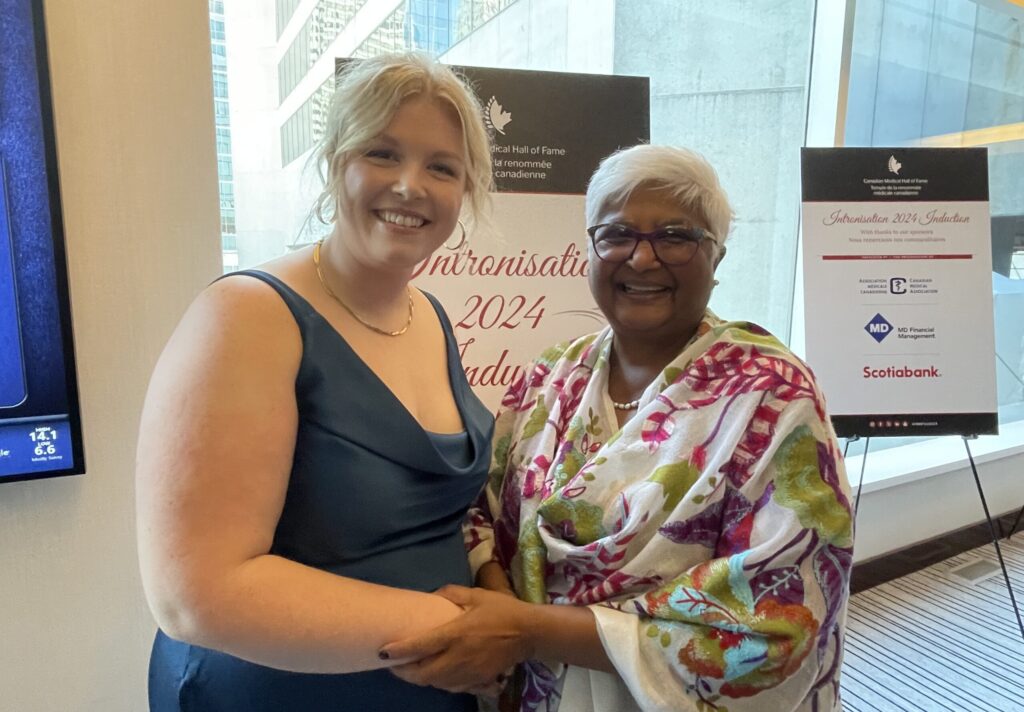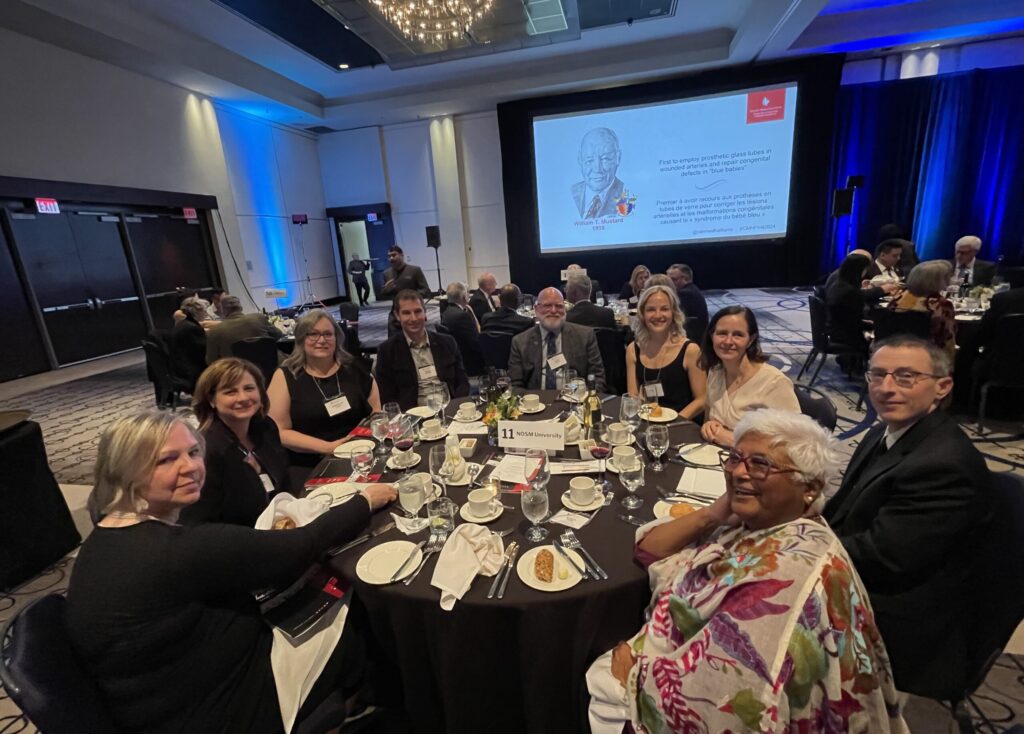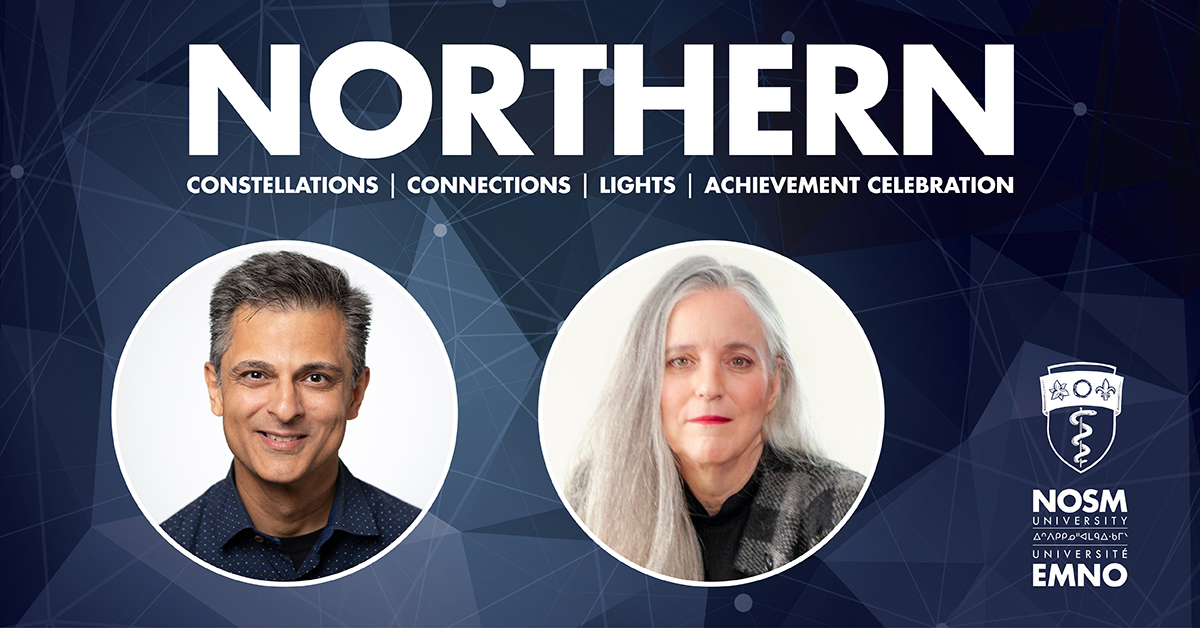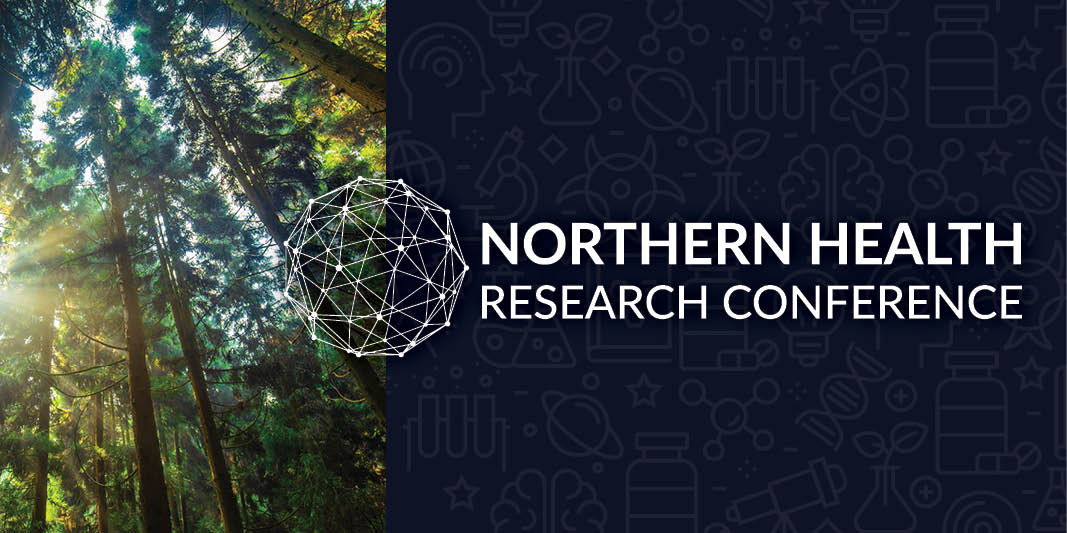Spring is in the air, and so is change!
Foremost, I want to extend my sincere and heartfelt thanks to our leadership, staff, faculty, and learners.
I suspect I do not acknowledge you enough. Acknowledging team members for their dedication and work is not just a nicety: it’s a fundamental aspect of effective leadership and team dynamics. When team members feel recognized and appreciated for their contributions, it fosters a positive work environment, boosts morale, and enhances overall productivity and engagement.
I am incredibly proud of NOSM University’s leadership—VPs, Vice-Deans, Associate and Assistant Deans, Directors, Managers, and indeed every single person who works with us. All have mastered the art of transition, change, and evolution. Each person on this team deserves to be applauded. The work being done both individually and collectively makes up the life blood of NOSM University.
To everyone who makes up the mosaic of NOSM University: thank you. I am so grateful for all you do.
“It is not joy that makes us grateful. It is gratitude that makes us joyful.”
There is rapid change underway right now in both the health-care sector and in higher education. Interestingly, many people fear change. Yet in health care, evidence-based medicine, and technology, the “refresh” button is built into the process. At NOSM University, there are many change management projects underway: expansion, curricular changes, new leadership, and more. In today’s dynamic and competitive environment, where (as we have seen) global events can quickly reshape entire landscapes, mastering change management is a strategic imperative. By adopting a structured approach, embracing certain key principles, and fostering a culture that embraces change, organizations can navigate transitions effectively, capitalize on opportunities, and emerge stronger and more resilient in the face of uncertainty.
Image inspired by Shutterstock, based on the Change Curve model credited to Elisabeth Kubler-Ross.
Change, in organizational terms, can encompass a wide array of initiatives, from implementing new technological systems to restructuring teams, launching new products, or altering strategic direction. Regardless of the specific change, its success often hinges on how well it is managed. Effective change management involves anticipating potential challenges, engaging stakeholders, communicating transparently, and providing support throughout the transition.
Compassion in leadership is a transformative quality that nurtures trust, fosters empathy, and cultivates a supportive environment for both leaders and their teams. While leadership often emphasizes strategic vision, decisiveness, and results, integrating compassion into leadership practices can lead to more sustainable and fulfilling outcomes. On the flip side, it is not uncommon for people to be overly critical of leaders, focusing solely on their shortcomings or mistakes while overlooking their strengths and accomplishments.
Recognizing and appreciating a leader’s strengths is essential for fostering a culture of support, growth, and collaboration. Moving the needle on necessary change while not destabilising the doers and the leaders is a fine balancing act. These last number of years, I have had to learn a great deal while managing the seismic changes at NOSM University. Learning to handle the sometimes-emotional toll of change on everyone has been an interesting journey for our entire leadership team.
My message is this: we are all pulling in the same direction to meet our mandate and improve health-care education and research in Northern Ontario. Let’s keep up the good work and manage change the way we manage everything else: with determination, ingenuity, and our signature resilience.
And a last word to health equity and social accountability.
This photo was posted on social media by Kiiwetinoong MPP Sol Mamakwa to bring attention to the issue of food insecurity in the North.
It is outrageous that the cost of nutritious food in Northern Ontario is so high. Food is a basic human right. The Northwestern Health Unit’s recent report The Real Cost of Eating Well in Northwestern Ontario says the cost to feed a family of four is $1,412.32 per month. An estimated one in five households in the region do not have enough food to eat, let alone access to the most nutritious or culturally appropriate options. This impacts well-being, prevention of health issues, and has deleterious effects on the growth and future of our society. Try this: search “cost of groceries in Northern Ontario” and see for yourself real photos from local stores. Orange juice for $26.99; peanut butter for $11.99; 4L of milk for $10.79.
Food insecurity in Northern Ontario presents a complex and pressing issue with far-reaching impacts on individuals, families, and communities. Despite being part of a resource-rich province, many residents in Northern Ontario struggle to access affordable, nutritious food on a consistent basis. Too many people mustchoose between paying rent, the electricity bill, or food for their kids. NOSM University is looking at much of this with the Dietetic Program, through our work at the Dr. Gilles Arcand Center for Health Equity, and through research led by Dr. Joseph LeBlanc and the NOURISH Project.
As the old saying goes, “The only time you look in a neighbour’s bowl is to make sure they have enough.” Too many don’t have enough. We all have a role to play in filling up bowls in Northern Ontario.
Miigwetch, thank you, marsi, merci,
Dr. Sarita Verma
President, Vice Chancellor, Dean and CEO
NOSM University
Save the Date: Earth Day
 Join NOSM University’s Action on Climate Change Committee (ACCC) on Earth Day for an insightful discussion on how your investments impact your carbon footprint.
Join NOSM University’s Action on Climate Change Committee (ACCC) on Earth Day for an insightful discussion on how your investments impact your carbon footprint.
April 22, 2024 | 12:00 p.m. – 1:00 p.m.
YouTube @NOSMtv
Speakers:
- Elaine Blacklock (Planetary Health Lead for NOSM University and Chair of the ACCC)
- Jean-François Démoré (Entrepreneur, Financial Innovator, and Sustainable Investing Advocate)
- Keegan Leahy (First Nations Financial Consultant)
- Julie Nicholls, CFP (Financial Strategist, Advocate for Ethical Investing)
To learn more, visit the Action on Climate Change Committee’s webpage.
NOSM University Presence at the 2024 International Congress on Academic Medicine
On Saturday, April 13, Dr. Sarita Verma and leaders at NOSM University attended the annual Canadian Medical Hall of Fame (CMHF) Induction Ceremony, held during the International Congress on Academic Medicine (ICAM) in Vancouver. This year, the CMHF recognized Taylor Murie, a NOSM University medical student, with the CMHF Award for 2023. The evening of Sunday, April 14, Dr. Verma hosted a reception at ICAM, welcoming 55 academic medicine colleagues to learn more about NOSM University’s impact in Northern Ontario.
Northern Constellations & Connections 2024: Don’t Miss Out!
Northern Constellations & Connections is Northern Ontario’s premiere conference for medical and health sciences faculty development. Hosted from May 2-4, 2024, at the Delta Toronto Airport and Conference Centre, participants can connect with peers, participate in continuing medical education, stay abreast of clinical best practices, experience hands-on simulation training, and develop leadership and teaching skills. This conference promises to deliver an experience relevant to Northern Ontario, rural and remote medical and health professionals and learners alike.
For more information and to register, visit the conference website.
Register Now: Northern Lights Pan-Northern Leadership Forum
The Northern Lights Pan-Northern Leadership Forum is relevant to Northern Ontario faculty, preceptors, and administrators. We understand that more practical leadership skill training is beneficial to leading teams of all sizes and disciplines across the health-care sector in Northern Ontario.
In partnership with NOSM University CEPD, the Canadian College of Health Leaders is organizing a full-day workshop tailored to different leadership roles within the Northern Ontario healthcare system.
Topics include:
- How to be Effective Advocating in a Low-Resource Environment featuring Dr. Jillie Retson, NOSM University
- Harmonizing Healthcare featuring Dr. Keith Adamson, Factor-Inwentash Faculty of Social Work, University of Toronto
- Time Management featuring Dr. Jaason Geerts and Shiyen Shu, Canadian College of Health Leaders
- Leading Effective Meetings featuring Dr. Jaason Geerts and Shiyen Shu,Canadian College of Health Leaders
When?
May 2, 2024, at the Delta Toronto Airport and Conference Centre
Who should register?
This workshop is intended for health professionals at any level, including those in their first years of practice and advanced leadership professionals.
Join us for an opportunity to develop your leadership skills and learn from colleagues from across Northern Ontario. Register today!
NOSM University Achievement Celebration: May 3
Let’s come together to celebrate the incredible accomplishments of our peers and colleagues. It’s a night of pride, inspiration, and celebration you won’t want to miss!
Already registered for the Northern Constellation & Connections conference? You’re in luck! Your registration automatically grants you access to the Achievement Celebration on May 3 – no extra registration is needed! Save the date and join us for an inspiring evening of celebration and networking.
Planning to attend as a guest or solely for pre-conference programs? Register for the NOSM University Achievement Celebration here.
NOSM University Convocation Ceremonies: May 24 and 31
On behalf of Dr. Sarita Verma, President, Vice-Chancellor, Dean, and CEO of NOSM University, and the NOSM University Senate, you’re invited to watch the Spring 2024 convocation ceremonies and graduation celebration on YouTube @NOSMtv.
Thunder Bay convocation ceremony
Friday, May 24, 2024 at 4:00 p.m.
Sudbury convocation ceremony
Friday, May 31, 2024 at 4:00 p.m.
If you have questions, please visit the Convocation website.
Northern Health Research Conference: June 10-11
The 2024 Northern Health Research Conference (NHRC) will be held from June 10-11, 2024 in Sudbury, Ontario. The conference demonstrates NOSM University’s commitment to health care and education to the people of Northern Ontario and beyond, and explores research activities within Northern Ontario arising from community-based activities. It highlights projects underway from students, residents, and community-based researchers. The conference provides opportunities for collaboration and community networking.
The 2024 keynote panel will deliver the session Advancing Health Equity Research: A Learning Collaborative Network Approach at NOSM University.
Keynote panelists include:
- Alex Anawati is an Associate Professor in the Clinical Sciences Division at NOSM University, an emergency physician and Clinical Lead for Social Accountability at Health Sciences North, and co-lead for the SAFE for Health Institutions Project.
- Erin Cameron is an Associate Professor at NOSM University in the Human Sciences Division and the Academic Director of the Dr. Gilles Arcand Centre for Health Equity.
- Joseph LeBlanc is the Associate Dean of Equity and Inclusion at NOSM University and the lead of the NOURISH Health Leadership initiative.
- Brianne Wood is an Associate Scientist of Social Accountability and Learning Health Systems jointly with Thunder Bay Regional Health Research Institute and NOSM University.
- Barb Zelek is a rural generalist, Professor and Clinical Sciences Division Head at NOSM University, and a passionate advocate for primary care research.


